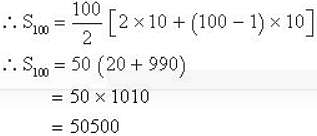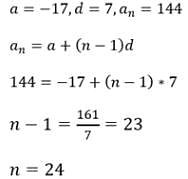Test: Arithmetic Progression (June 16) - JEE MCQ
Test Description
10 Questions MCQ Test - Test: Arithmetic Progression (June 16)
Test: Arithmetic Progression (June 16) for JEE 2024 is part of JEE preparation. The Test: Arithmetic Progression (June 16) questions and answers have been prepared
according to the JEE exam syllabus.The Test: Arithmetic Progression (June 16) MCQs are made for JEE 2024 Exam.
Find important definitions, questions, notes, meanings, examples, exercises, MCQs and online tests for Test: Arithmetic Progression (June 16) below.
Solutions of Test: Arithmetic Progression (June 16) questions in English are available as part of our course for JEE & Test: Arithmetic Progression (June 16) solutions in
Hindi for JEE course.
Download more important topics, notes, lectures and mock test series for JEE Exam by signing up for free. Attempt Test: Arithmetic Progression (June 16) | 10 questions in 20 minutes | Mock test for JEE preparation | Free important questions MCQ to study for JEE Exam | Download free PDF with solutions
Test: Arithmetic Progression (June 16) - Question 1
If “a” is the first term and ℓ is the last term (nth term), then the sum of all the term of this sequence is given by:
Detailed Solution for Test: Arithmetic Progression (June 16) - Question 1
Test: Arithmetic Progression (June 16) - Question 2
Find the sum of first hundred even natural numbers which are divisible by 5.
Detailed Solution for Test: Arithmetic Progression (June 16) - Question 2
| 1 Crore+ students have signed up on EduRev. Have you? Download the App |
Test: Arithmetic Progression (June 16) - Question 3
If the 10 times of the 10th term of an AP is equal to 15 times to the 15th term, then the 25th term is:
Detailed Solution for Test: Arithmetic Progression (June 16) - Question 3
Test: Arithmetic Progression (June 16) - Question 4
Find the missing number. 1, 4, 9, 16, 25, 36, 49, (....)
Detailed Solution for Test: Arithmetic Progression (June 16) - Question 4
Test: Arithmetic Progression (June 16) - Question 5
The first negative term of the A.P.62,57,52…. is the
Detailed Solution for Test: Arithmetic Progression (June 16) - Question 5
Test: Arithmetic Progression (June 16) - Question 6
How many terms of the series 24,20,16,…are required so that their sum is 72?
Detailed Solution for Test: Arithmetic Progression (June 16) - Question 6
Test: Arithmetic Progression (June 16) - Question 7
Roots of quadratic equation x2 – 3x = 0 , will be
Detailed Solution for Test: Arithmetic Progression (June 16) - Question 7
Test: Arithmetic Progression (June 16) - Question 8
The number of terms in the sequence -17, -10, -3,…., 144 is:
Detailed Solution for Test: Arithmetic Progression (June 16) - Question 8
Test: Arithmetic Progression (June 16) - Question 9
Three terms in A.P. are such that their sum is 45. What is the middle term?
Detailed Solution for Test: Arithmetic Progression (June 16) - Question 9
Test: Arithmetic Progression (June 16) - Question 10
The terms of an A.P. are doubled, then the resulting sequence is
Detailed Solution for Test: Arithmetic Progression (June 16) - Question 10
Information about Test: Arithmetic Progression (June 16) Page
In this test you can find the Exam questions for Test: Arithmetic Progression (June 16) solved & explained in the simplest way possible.
Besides giving Questions and answers for Test: Arithmetic Progression (June 16), EduRev gives you an ample number of Online tests for practice
Download as PDF



















